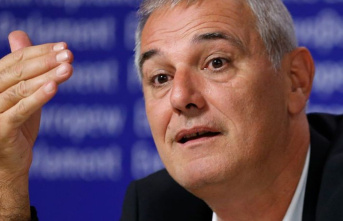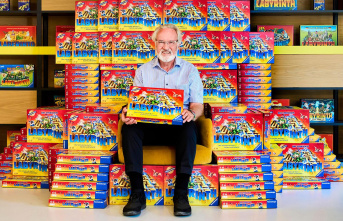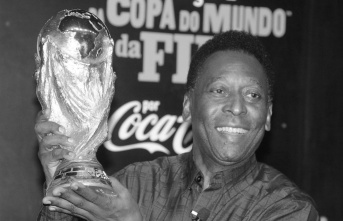Of course he was the best, or rather: the very best. The best soccer player of all time. At least that's what many of the greatest experts think. Just like Ferenc Puskás (1927-2006), brilliant Real Madrid striker. The Hungarian once said: "The best player in history was Alfredo di Stefano, but I refuse to classify Pele as a player. He was above it." Now Pelé, the king of football, has died in São Paulo, Brazil, at the age of 82.
"Inspiration and love marked the journey of King Pele, who passed away peacefully today," reads a post on the official Instagram account of arguably the greatest footballer who might ever live. A ball magician for eternity.
Even the one who should know best, Pelé himself, once said in all modesty: "There will only be one Pelé, just as there was only one Frank Sinatra or only one Michelangelo. I was the best." Whatever Pelé did on the field, he did it at the highest level: dribble like Messi or Diego Maradona, direct the game like di Stefano or Zinedine Zidane, shoot, head and score like Cristiano Ronaldo or Gerd Müller. Pele could do anything.
His real name was Edson Arantes do Nascimento. He was born in Três Corações in the state of Minas Gerais in southern Brazil in 1940. Today the area is also called "Terra do Rei Pelé", the land of King Pelé. The family was poor, father Dondinho gave up his football career because of a knee injury and later worked as a cleaner.
Little seven-year-old Edson, whom everyone just called "Dico", had to contribute to the family's upkeep as a shoeshine boy and nut seller. In the evenings, however, when he was playing barefoot in the street with the other children with a ball made of old socks tied together, his lithe, cat-like body movements were already noticeable.
That's where the nickname Pelé must have come from. He later explained in his autobiography that as a child he had a crush on goalkeeper Bilé. Because of his childlike pronunciation, it became "Pilé" and finally Pelé. He himself had never particularly liked the name.
"I hate that damn nickname. It wasn't even a real word, it didn't mean anything," wrote the soccer star. He is said to have even become violent towards classmates who called him Pelé. Even later, as an adult, he repeatedly insisted that his first name was Edson - and not Pelé.
His outstanding talent as a footballer was recognized by former Brazil international Waldemar de Brito, who recommended him to professional club FC Santos, where Pelé signed on as a 15-year-old. In its first season, the "Pérola Negra" (Black Pearl) scored 36 goals in 29 games - and was called up to Brazil's national team at 16, a year before the 1958 World Cup in Sweden.
She became the grand stage of a 17-year-old player who the ball followed like a perfectly trained dog. He scored six goals in four games, including two in the final against Sweden. Brazil won 5-2 and a magic trick by the very young Brazilian went down in football history: Pelé juggled the ball through the Swedish penalty area, lifted it over three Swedes in a row and then headed it into the net. His opponent Sigvard Parling then said in amazement: "After the fifth goal even I wanted to applaud."
Pelé became the youngest world champion of all time, a new world star was born. The Brazilian government declared it a national treasure and prohibited the much sought-after kicker from being transferred abroad. His ball skills have been declared an art, not only in Brazil. "When he took a free-kick, the opposing players who formed the wall wanted to turn around in order not to miss the goal," wrote the Uruguayan poet Eduardo Galeano.
In his professional career until 1977, Pelé scored 1,281 goals in 1,365 games. With the national team he was world champion three times (1958, 1962, 1970) and scored 77 goals in a total of 92 international matches. His club FC Santos, to which he remained loyal until 1974, became the best club team in the world thanks to Pelé. In 1959 he scored 127 goals in one season, scoring eight goals in one game against Botafogo.
In 1975 he changed clubs for the only time in his life and went to Cosmos New York, which he led to the US championship, incidentally alongside Franz Beckenbauer (77). In 1977 his active career finally came to an end. Pelé got his university entrance qualification to study at the sports university. He did advertising, founded a marketing company, became a UN Goodwill Ambassador and (from 1995 to 1998) even Extraordinary Minister of Sports of Brazil.
Pelé's daughter, Kely Nascimento (55), also spoke to Instagram on Thursday. She published a picture that apparently shows several family members holding the football icon's hands. "Everything we are is because of you. We love you infinitely. Rest in peace," she wrote.
The king knew very well the difference between his real person and the legend of Pelé. In his autobiography he wrote: "The citizen Edson Arantes do Nascimento has mastered all the ups and downs of life, has laughed, cried, endured much pain, enjoyed many triumphs. He is mortal. Pelé, on the other hand, is immortal and will always be the dream of all children stay, will always shine, will never have to feel pain."












